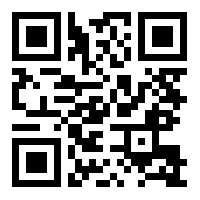2
Chapter 1 Learning Objectives:
Upon reading this chapter, the student should be able to:
- Recognize that whether a relationship is personal or professional does not necessarily determine which acts are right or wrong within it.


Watch this video or scan the QR code to learn more about business versus personal relationships.
The distinction is usually made between personal relationships and professional ones. I think it is an unimportant distinction for improving one’s relationships with other people. I shall make little use of it, since I believe that anything one might want to cover under professional ethics or professionally proper behavior will also fall under the more general category simply of ethical behavior or proper behavior. I will dwell more on this in the chapter on ethics. Let me just say for now that professional relationships between people,simply because they are between people, are also then personal relationships, though they may be of a different, or more or less involved, scope than one’s normally considered personal relationships. That is, one may see one’s doctor for only thirty minutes, say once a year, but see a friend more. One might appear disrobed in front of a doctor but not in front of a friend.
These kinds of differences are made right or feasible because of what is involved in the relationship, not because it is a professional or social relationship as such. For example, if a person has medical knowledge and the proper degrees (for legal purposes) but chooses not to practice medicine professionally (chooses not to make a living from it), it would be just as right for her or him to examine the unclothed anatomy (for health reasons) of another as it would be for a professional doctor. With the proper knowledge, even without the proper degrees, it might be right in some sort of emergency situation. The “right-making” characteristics involved in the action here are the patient’s consent, and the proper knowledge of the examiner, and the proper use of that knowledge in this particular situation, not whether the relationship is professional or not. A doctor does not have the right to make sexual advances toward a nude patient, not because it is unprofessional (that is a result of its being wrong, not a cause), but because the patient is not, by being nude for a medical examination, thereby giving consent for sexual license, is not expecting it, is likely to be offended, scared or embarrassed because of it, and is in a disconcertingly vulnerable state for such an advance (or virtual attack).
Likewise, though an employer may angrily chew out an employee for an error of some sort, it seems to me this act is only right if the employee deserves it due to his prior character faults and if this is the least harmful way of curbing or curing those faults. The chewing out is warranted only if it is deserved and/or is the least damaging way of correcting the situation or preventing recurrences. It is not made right because employers should be able to treat employees any way they want (they shouldn’t be) and therefore in a different manner from the way they treat friends. If a person should be chewed out, then it might be right for an employer, friend, mother, or, in some cases, even a stranger to do it. And if the chewing out is undeserved, or unfair, then it is wrong for anyone, including the employer, to do it.
Different Kinds of Professional Relationships
There are a number of different kinds of relationships that may be described as professional or derived from professional sources. There are employer-employee relationships, say between a dentist and a dental assistant he employs, or between a store owner and clerk. There are relationships of service like these, but where a third party does the employing— for example, a secretary and boss who both work for a corporation. There are relationships of service which are of more temporary durations, such as doctor-patient, lawyer-client, student- teacher, salesman- customer, barber-client, photographer-subject, etc.
There are also professional relationships which are not based on a servant-boss type of distinction, but on a more equal basis; for example, people working together in an area or profession who come together because of their profession or place of work — say different secretaries of equal rank, different executives of equal rank, or different clerks of equal rank working in the same company; different teachers at the same school.
In short, a person’s job may bring her or him into contact with somebody they work for or who works for them (either through direct employment or a third party’s), and a person’s job might bring them into contact with people they work with but whom they neither supervise nor are supervised by. Some of these relationships might be intended for a long duration; others for short, one time, or occasional periods.
Now there are different legal, organizational, and company stipulations concerning professional relationships and conduct. For example, two people making a contractual business agreement thereby have legal obligations (and enforcing sanctions) the usual friendly agreement does not have. (But a friendly agreement is just as morally binding as a business agreement. Both need to be honored unless special circumstances arise allowing either agreement to be rightfully dissolved.) Or, say, a doctor has the obligation to report to the police gunshot wounds of patients, an obligation that the patients’ friends do not have. Examples of organizational restrictions are those posed by, say, a Bar Association or AMA group on its member lawyers or doctors, or by the U.S. Congress on its members whereby punishment for breaches might involve censure, loss of certain privileges, or expulsion from membership. Companies or boards may have rules concerning proper conduct for employees, such as conduct for teachers toward their students or supervisors.
In some instances, there may be conflicting obligations from different relationships — a person’s company may want him/her to keep secret the impending firing of a co-worker that might be his/her spouse or spouse’s close relative. This puts the person in an ethical dilemma for which there may be no easy solution. But this could be just as true if the co-worker were simply a friend or acquaintance one respected at work. There could be similar business or professional dilemmas not involving personal relationships at all, nor even involving harming the business by disobedience to its policies. For instance, situations might arise in business where important opportunities for your company could be lost if you followed company policy. (This is sometimes true in war too for a soldier faced with whether to do something he believes is beneficial to the military and his country if it means having to disobey military regulations to do it.) The decisions you make in any of these kinds of cases are always ethical ones, since you always have the choice whether to follow policy or to ignore it. That is the primary decision, and it has to be made on grounds outside of the policy itself. You have to first decide whether policy is right in a particular instance or not. Further, there can be conflicting totally personal obligations. You do not have to look to business to find such problems. People often have to choose between courses of action that will upset or disappoint either their spouse or their parents, or their spouse or children.
I am not denying there are legal and organizational distinctions between personal and professional relationships; I am only denying that the distinction between personal and professional relationships is of any use as such in understanding the relationships we have in our lives, and I am denying that the distinction and the legal and institutional rules or codes are of much use in determining our real ethical obligations or describing correct conduct toward others (which is a large aspect of the relationships we have with others). Some are not even good ethics; and some only serve the group, not the public. They are misnamed as ethics, and instead should be called sanctioned practices. This latter claim will be further supported in the chapter dealing with ethics. It is, I maintain, easier and more useful and beneficial to think of all relationships between people as being personal relationships, with some having special circumstances (whether for personal or business reasons) that may make them different from others in terms of the behavior, thoughts, and feelings that are psychologically or ethically appropriate. A dentist treats us differently from a doctor, CPA, or television repairman, not because they are not all professionals, but because their professions and their expertise (what we call on them for) are different. Well, similarly we can find reasons as to why our relationships with our mother, our mother-in-law, and our spouse are different from each other and different from our relationships with our doctor and our tv repairman without having to say only that the latter are professional and the former are not.
Key Takeaways
- All relationships, whether professional or not are also personal.
- Something wrong to do to someone is not made right by the relationship’s being a professional one.
Key Terms
- Professional relationships are those involving acts done as part of at least one person’s business, even if one does not charge money for it. It often involves acts requiring a licensed professional.
- Personal relationships are those in which acts generally are not based on business or commercial transactions or on the profession of one or more participants.
Chapter Review Questions
-
- Question: What do you think are some differences and some similarities between personal and professional relationships?
- Question: What are the potential characteristics of all relationships between people?